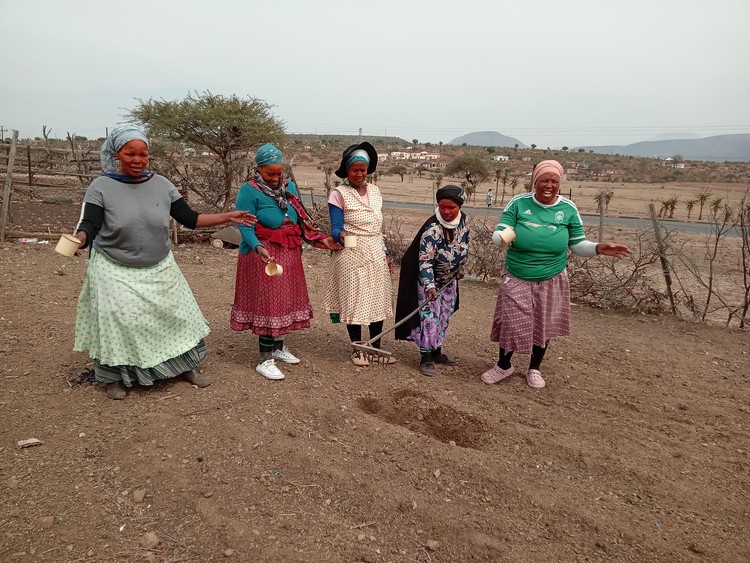
9 October 2024
Women in Nyandu pose with empty cups in their empty garden. They say they drink one cup of water a day and can’t plant crops because there is no water for irrigation. Photos: Bongane Motaung
Jabu Mthembu and Duduzile Sokhela get up every morning at 3am to walk to the communal borehole in Nyandu to fetch water. The borehole is only a kilometre or two away, but the queues are long. And sometimes the water runs out.
The two women live in uMsinga in the uMzinyathi district municipality of KwaZulu-Natal. Water infrastructure was installed in the area several years ago, but most of it has never worked.
When the Nyandu borehole is dry and there is no rain water to collect, Mthembu and Sokhela go to fetch water from the river in nearby eBhubesini village. The only alternative is to buy water from one of the private water trucks which visit the village.
“Water from the river is dirty because we share it with animals,” says Sokhela. “But not all of us can afford to buy water.”
Households in the area are mostly headed up by women, because the men have left the villages to look for work.
In eNgcendeni, also in uMsinga, Mthembu says many of the women have given up ploughing the land because there is not enough water for irrigation.
“Each family member drinks one cup of water per day and our children wear their uniform for the whole week to save the little water we have.”
Jabu Mthembu (left) and Duduzile Sokhela say some water infrastructure was installed but without taps, and has never worked.
In nearby Mbindolo, there is also a single borehole. But infrastructure has been built. Mbindolo resident Xolani Majozi says four years ago he got “Gobiqolo” (back-breaking) work for a contractor installing water infrastructure. But the pipes never reached his part of the village.
Families there saved money, and bought their own pipes which they connected to the water supply. But the water only lasted a few days, says Majozi. Municipal workers from the water department in Solomon Linda (Pomeroy) came several times but never fixed the system, he says.
Now Majozi is a taxi driver and sometimes goes to fetch water from neighbouring villages for households in Mzinga.
Women complain about not having enough water. We drink one cup a day, says one woman. Video: Bongane Motaung
Dumisani Madlabane, who used to be the local induna, says he once borrowed a rainwater tank from the ward councillor. But the tank was sent back and the Mbindolo families were left stranded again, with just the borehole and the Mbindolo river.
Majozi showed GroundUp the Mbindolo borehole, where there was a long queue of people, including old people and children, standing with their containers, waiting their turn to fetch water.
“We are concerned why the government side-lined us from receiving proper water infrastructure installation,” Majozi said.
In Nyandu, Mbindolo, eBhubesini and other villages, GroundUp saw broken communal water taps and metering equipment. All the taps were dry.
Learners fetch water from the river, which they say is dirty.
Grade 6 learner Lungelo Mpongose was on her way to fetch water from the river in eBhubesini. “Here our community struggle is the water shortage,” said Lungelo, who is at Nyandu Primary School. “We share the river with dogs, cows and other animals. Our water is dirty. Some residents throw in waste like plastic, papers and sometimes dead animals, but still we have to use it for drinking and cooking.”
Grade 10 learner Nozipho Mbhense said learners already walk long distances to school daily, and then after school they have to walk again to fetch water. “We do not get enough time to attend to study. We wish the government would assist our community because the water challenge is the most hindering factor of our lives.”
Asked to comment, Msinga Municipality communications officer Thobeka Mchunu said only the District Municipality could comment on water issues. But UMzinyathi District Communications officer Nkanyiso Cebekhulu did not respond to questions sent to him, in spite of two follow-ups.
Published in partnership with Intuthuko News.